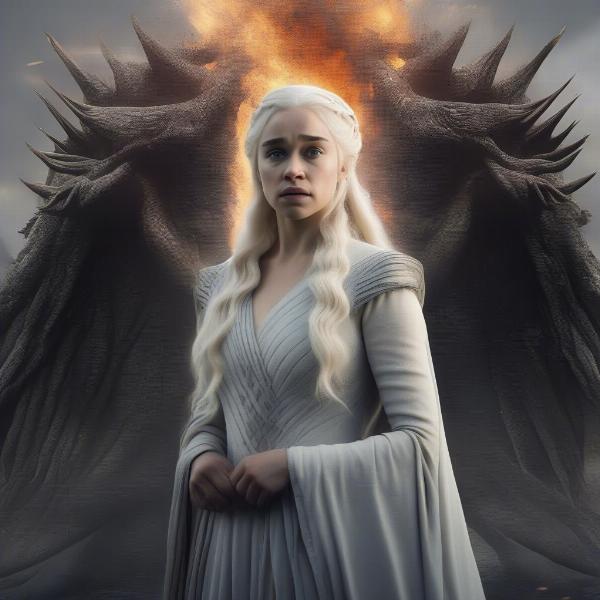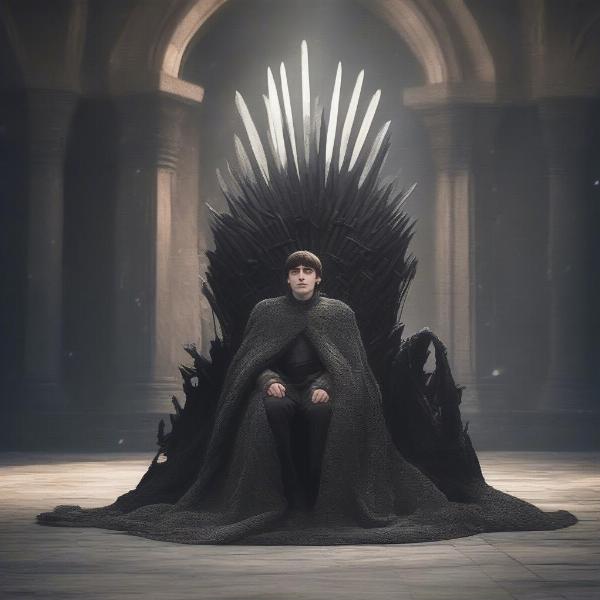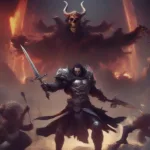The ending of Game of Thrones sparked a wildfire of controversy amongst fans. The eighth season’s rushed pacing and perceived deviations from established character arcs left many wondering how was Game of Thrones supposed to end? Let’s delve into George R.R. Martin’s original intentions, fan theories, and the factors that may have contributed to the show’s divisive finale.
From the very beginning, the sprawling epic of ice and fire promised a complex resolution. The show, initially closely aligned with Martin’s A Song of Ice and Fire books, eventually diverged, taking narrative liberties that ultimately shaped its own destiny. This ultimately led to a conclusion vastly different from what many had anticipated based on the source material and early seasons. Understanding the initial trajectory helps to contextualize the final season’s perceived shortcomings and appreciate the grand tapestry Martin intended to weave.
George R.R. Martin’s Vision: A Tale of Ice and Fire
Martin envisioned a bittersweet conclusion, a symphony of triumph and tragedy. While specific plot points remain shrouded in secrecy, waiting for the final two books of A Song of Ice and Fire, he’s hinted at core themes and character arcs that would underpin the ending. The ultimate conflict between ice (the White Walkers) and fire (Daenerys Targaryen, and potentially Jon Snow) was always central to the narrative. However, the human element, the political machinations and personal betrayals, were equally important, suggesting a more nuanced resolution than a simple good-versus-evil showdown.
According to interviews and released excerpts, Martin’s ending emphasizes the devastating cost of war and the cyclical nature of power. The throne itself, the object of so much desire and bloodshed, may ultimately prove to be meaningless or even destructive. This adds a layer of thematic depth that goes beyond simply crowning a victor. While the show touched on these elements, many fans felt they weren’t explored with the same depth and complexity that Martin has hinted at in his writing.
Similar to the unexpected turns in the Red Wedding, which shocked viewers unfamiliar with the books, the true ending likely holds surprises that subvert expectations. Just like how the question of how did rhaegar targaryen die in game of thrones became a focal point, the ending was always designed to be impactful and memorable, potentially challenging the very notion of a traditional “happy ending.”
Fan Theories and Expectations: A Song of Speculation
Over the years, fans developed intricate theories based on clues sprinkled throughout the books and the show. These theories, ranging from Jon Snow’s true parentage to the ultimate fate of Westeros, fuelled online discussions and shaped viewer expectations. Many predicted a more significant role for Bran Stark, whose powers of foresight and ability to influence the past suggested a potentially crucial role in shaping the narrative. Others believed Daenerys Targaryen’s descent into madness would be more gradual and tragically compelling, highlighting the corrupting influence of absolute power.
One prominent theory focused on Azor Ahai, a legendary figure prophesied to return and defeat the darkness. Speculation abounded about which character might fulfill this prophecy, with many believing it would be Jon Snow or Daenerys. These theories, deeply embedded in the fan community, contributed to the widespread disappointment when the show’s ending seemingly deviated from these anticipated storylines.
The Show’s Divergence: A Song of Dissonance
As the show progressed beyond the published books, the writers faced the challenge of continuing the story without Martin’s completed narrative as a guide. This divergence, coupled with the decision to condense the final seasons, arguably led to a more streamlined and less nuanced conclusion. Certain characters’ storylines were accelerated or truncated, and complex plot points were simplified.
The show’s portrayal of Daenerys’s descent into madness, for example, felt rushed and less earned to some viewers. Similarly, Bran Stark’s ascension to the throne, while foreshadowed in earlier seasons, lacked the build-up and exploration of his motivations that many fans expected.
 Daenerys Targaryen alternate ending depiction: Showcases a more nuanced portrayal of Daenerys Targaryen's descent into madness, emphasizing the internal conflict and tragic downfall.
Daenerys Targaryen alternate ending depiction: Showcases a more nuanced portrayal of Daenerys Targaryen's descent into madness, emphasizing the internal conflict and tragic downfall.
Was It a Good Ending? A Song of Subjectivity
Whether the Game of Thrones ending was “good” is ultimately subjective. While some appreciated the unexpected twists and the subversion of traditional fantasy tropes, others felt it betrayed the established character arcs and thematic complexity of the story. The rushed pacing and simplified plotlines undoubtedly contributed to the mixed reception.
“The ending, while controversial, serves as a testament to the enduring power of narrative and the impact of collective storytelling,” notes fictional game analyst and critic, Amelia Blackwood, PhD. “It reminds us that even in the most meticulously crafted worlds, the journey can sometimes overshadow the destination.” This highlights the importance of considering both the final result and the narrative process leading up to it.
However, it’s important to acknowledge the show’s groundbreaking achievements in television storytelling. Its epic scale, complex characters, and willingness to take risks captivated audiences worldwide and redefined the landscape of fantasy television. The cultural impact of Game of Thrones is undeniable, regardless of the final season’s reception. It’s a testament to the power of world-building, immersive storytelling, and the enduring appeal of epic fantasy.
Why the Deviation? A Song of Production
Several factors contributed to the show’s deviation from Martin’s intended path. The sheer scale and complexity of the story, combined with the logistical challenges of adapting it to television, inevitably led to compromises. The desire to conclude the series within a certain timeframe also played a role, potentially impacting the pacing and depth of the final seasons.
David Benioff and D.B. Weiss, the showrunners, have stated that they aimed for a concise and impactful ending, focusing on the core themes of power, betrayal, and the cyclical nature of history. While their intentions were undoubtedly noble, the execution ultimately divided audiences.
 Bran Stark as King – alternate scene: Depicts a more impactful and emotionally resonant scene of Bran Stark's ascension to the throne.
Bran Stark as King – alternate scene: Depicts a more impactful and emotionally resonant scene of Bran Stark's ascension to the throne.
How Was Game of Thrones Meant to End? A Song of Hope
While the show offered its own interpretation of the ending, the question of how Game of Thrones was meant to end remains open. George R.R. Martin continues to work on the final two books of A Song of Ice and Fire, promising a conclusion that may be significantly different from the show. Fans eagerly await his final word, hoping for a resolution that satisfies their years of investment in the world of Westeros. Ultimately, the true ending remains a mystery, a song yet to be sung.
Conclusion: The Song Continues
Despite the controversy surrounding the final season, the legacy of Game of Thrones remains undeniable. The questions surrounding how it was supposed to end will likely continue to be debated for years to come. Ultimately, both the show and the books offer unique and compelling interpretations of this epic saga, leaving audiences to ponder the complexities of power, destiny, and the enduring struggle for the Iron Throne. What are your thoughts on how Game of Thrones ended? Share your opinions and theories in the comments below.
FAQ
-
Did George R.R. Martin provide the showrunners with his planned ending? While Martin shared broad strokes of his intended ending with the showrunners, the details and specific plot points remain undisclosed.
-
Why did the show deviate so much from the books? Several factors contributed, including the show surpassing the published material, logistical constraints, and the showrunners’ creative choices.
-
Will the books have a different ending? Martin has indicated that the book’s ending will differ, though the extent of the differences remains to be seen.
-
Are there any clues in the books about the true ending? Fans continue to dissect the books for clues, but much of the ending remains shrouded in mystery.
-
Why was Daenerys’s descent into madness so controversial? Many viewers felt the show’s depiction was rushed and lacked the nuanced development seen in earlier seasons.
-
What is the significance of Bran Stark becoming king? Bran’s ascension represents an unexpected turn, raising questions about the nature of leadership and the role of foresight in shaping history.
-
Will we ever know the true ending? The release of Martin’s final two books is the only way to definitively answer this question.

